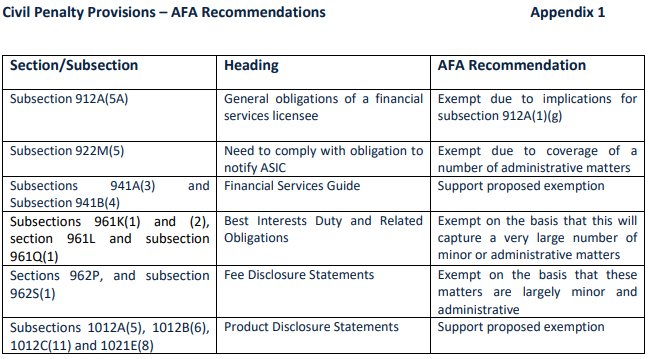The AFA has called for Treasury and the Government to undertake further analysis of the new breach reporting regime and consider a deferral of the commencement date of the regime.
In its submission to Treasury on the draft Financial Sector Reform (Hayne Royal Commission Response – Protecting Consumers (2020 Measures)) Regulations 2021: breach reporting regulation, the association says that it is particularly concerned about the implications of the new breach reporting regime for the financial advice sector, “where we anticipate an exponential increase in the number of matters that need to be reported.”
The AFA says it supports the self-reporting of significant breaches, but sees the current consultation process as “…an important opportunity to reduce what we see as a substantial increase in the scale and complexity of the new breach reporting regime that has been introduced as part of the Financial Sector Reform (Hayne Royal Commission Response) Bill 2020.”
In setting out its concerns about the complexity and impact of this new regime, the association argues the impact is much greater than anticipated when the Bill was drafted, and it has therefore recommended that the Government consider a deferral of the commencement of the new regime.
…the new regime “…will involve an exponential increase in the number of breaches that need to be reported and many of these will be of a largely administrative nature.”…
In its submission, the AFA notes it has a serious concern with respect to the implications of the Bill, which it says is moving away considerably from the concept of significant breach reporting and that the new regime “…will involve an exponential increase in the number of breaches that need to be reported and many of these will be of a largely administrative nature.”
It notes the other key point that Commissioner Hayne made in his interim report was the need to review and reduce the complexity of the requirements of the Corporations Act.
“Unfortunately, the new breach reporting regime represents a substantial increase in the scale of complexity and, in our view, this is virtually impossible for a small financial advice licensee to comply with.”
The AFA’s focus in its submission is on the additional civil penalty provisions that it believes should be exempt from the regime across areas including:
- General Obligations of Financial Services Licensees
- The Need to Comply with Obligation to Notify ASIC
- Failure to Provide a Financial Services Guide
- Best Interests Duty and Related Obligations
- Fee Disclosure Statement Breaches
- Product Disclosure Statement Breaches
The submission notes that financial advice licensees are required to undertake a detailed audit of a number of financial advice files for each adviser every year and that this process inevitably results in a number of matters being identified, even for those advisers with a good compliance track record.
…The reality is that the compliance regime for financial advice is very complex, and this means that minor breaches are common…
“The vast majority of these matters would involve no consumer detriment and are largely administrative or record keeping matters. The reality is that the compliance regime for financial advice is very complex, and this means that minor breaches are common. It does not in any way suggest that the quality of the advice is poor, or that the clients are at a greater risk of the prospect of detriment.”
The AFA says it is motivated to ensure that the cost impact of this reform is not excessive adding that licensees will need to carefully review each potential breach and for licensees that lack in-house lawyers or compliance resources, they will need to seek external guidance before deciding to report a breach.
“It is this cost, along with the extra management time and oversight that will be necessary, that will have a very material impact on the cost of financial advice. Ultimately clients will end out paying for this.”




